-
Syria in the context of the Ukrainian war The Russian project and the Turkish role
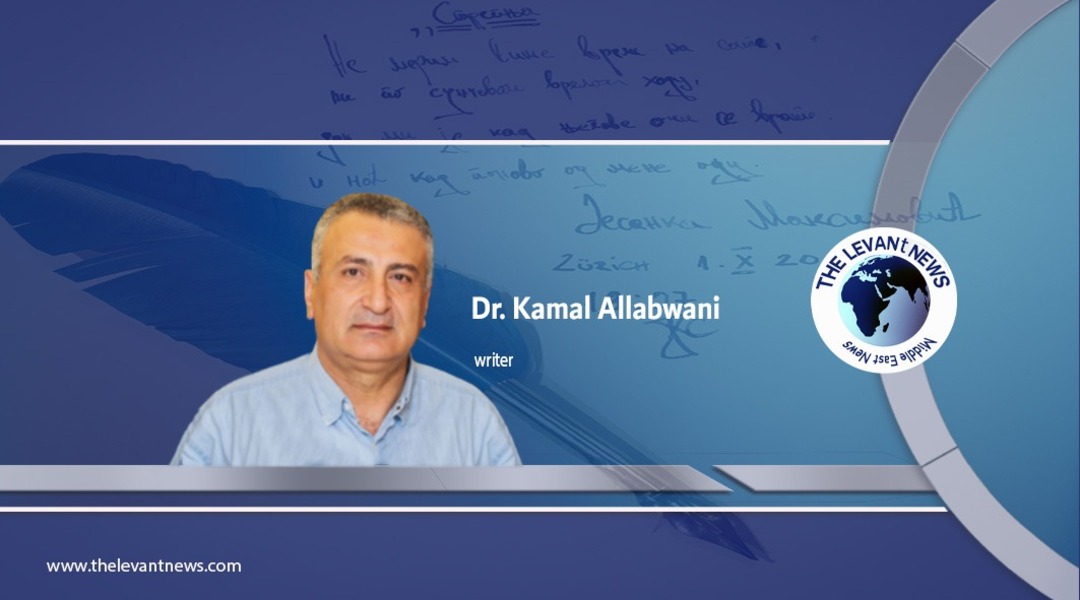
The outbreak of the international conflict linked the situation in Syria to the Ukraine conflict. The recent developments in northern Syria are not the result of internal conflicts. It is instead an implementation of a policy that was agreed upon at the Tehran Summit on 19/7/2022, which charted the role of each country in Syria in proportion to the (Russian Chinese Iranian) alliance.
Erdogan's Turkey is now walking with it, and other Gulf Arab countries are hesitant to join it.
There is a working paper prepared by the Russian International Affairs Council entitled:
(Settling the Syrian Conflict Amid the Ukrainian Crisis. Political Economy Perspective) issued No. 67 of 2022.
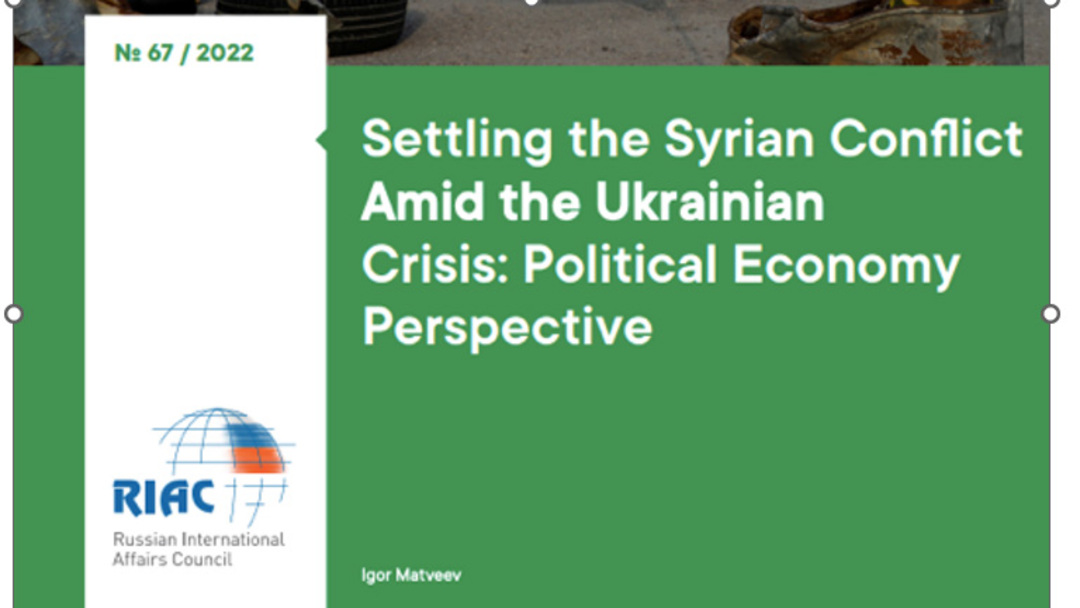
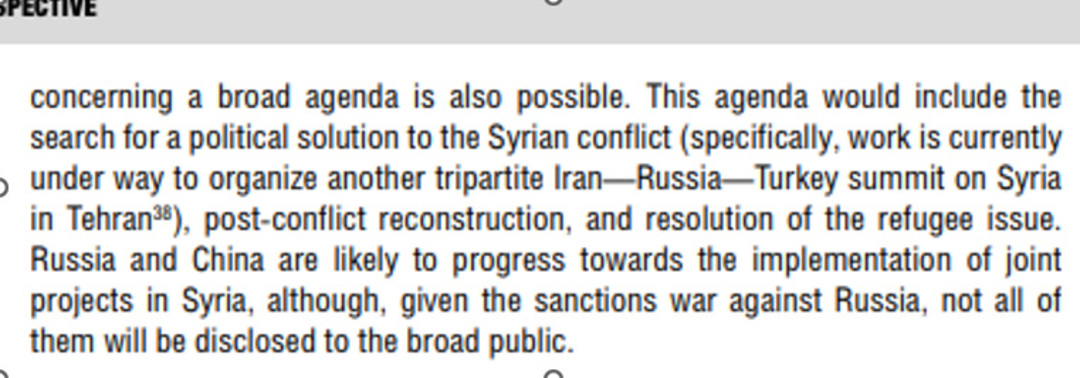
The working paper outlined a recovery plan for Syria based on the economic factor to which China, Iran, Russia, and Turkey will contribute. And on an acceptance of political and security decentralization, which means the continuation of the influence as it is now, sharing of interests and areas of power, including southern Syria, which can develop its autonomous system that can reduce Israel and Jordanian fear, and does not exclude the participation of northern Syria, which is dominated by the US-backed Kurdish SDF, which built a network of interests with the regime related to security and military cooperation, oil and grain.
The paper also deals with the scenarios of the north controlled by Turkey, which is the last stronghold of the opposition. It reviews the expected options, and chooses the best ones that Turkey should make, in preparation for the reintegration of the north under the tent with the Syrian regime through gradual reconciliation so that the dominance of the customs regime and its economic system extends over the entire Syrian area. All the roads and crossings, even in the presence of several security and military autonomy systems.
The economy is the basis, and it will unite in the end the political variation according to Marxist theory. The dramatic differences that have no solution now must be jumped over by recognizing the military victory of the regime, which is a source of legitimacy according to the Russians criteria. The paper does not address any future security or political changes. Instead, it consolidates the current political-military security reality, using the economic factor only as a variable element that must be relied upon. The Russians always insist on the implementation of Security Council Resolution 2642 regarding early recovery programs attempting to jump over Resolution 2254, which stipulate establishing a transitional authority, holding elections, and applying justice.
The paper looks positively at the openness of some Arab and Gulf countries to the Syrian regime. It encourages them to start projects with the Syrian government, especially the Egyptian gas and energy pipeline project toward Lebanon, as well as some European countries’ movement towards restoring economic, diplomatic, and security relations with the Syrian regime as political realism. While the paper recognizes the superiority of China’s capabilities and the weighting of its future dominance as a more vigorous supporter of the Syrian economy, it does not diminish Iran’s ability and the expansion of its influence within the economic, security, political, social and military system which makes it currently dominating to the Syrian state, whose leaders are drowning in rivalries among themselves, according to the paper. Russia would be satisfied with controlling raw materials and underground resources such as oil and phosphates and full political supervision of its sovereign decision. The paper looks positively at the possibility of Iran returning to the joint nuclear cooperation agreement with the West, which will inject huge sums that will allow Iran to increase its investment in the Syrian economy, consolidate its presence on Syrian soil, and strengthen the Iranian regime in Tehran. At the same time, Russia benefits from Iran's presence in Syria,Iraq, and Lebanon while China benefits from the Shiite Crescent presence through the Silk Road. The alliance of Russia, China, and Iran is substantial. The Syrian regime calls them brothers.
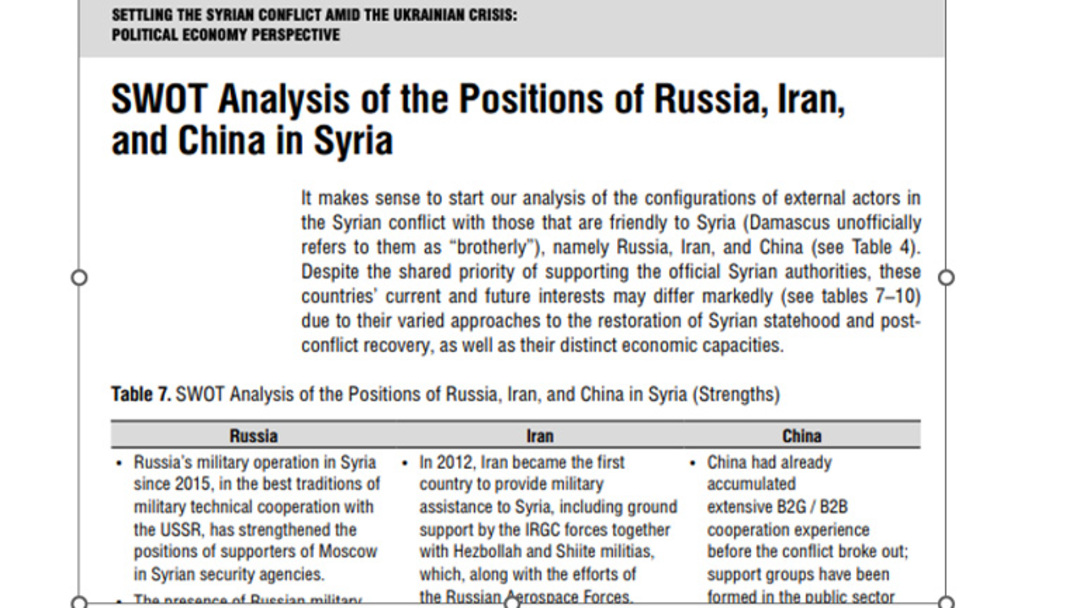
The United States should pay close attention to the collaborative interests between those nations as it may directly impact Western economy. China has started its investments in Syria decades ago and the visit of its foreign minister to Syria is frequent. China also politically supported the Assad regime with more than 15 UN vetoes in the Security Council. It directly supervises joints and infrastructure in the Iranian and Iraqi economy and plans to expand it to Syria and Lebanon. It has built unique relationships with Lebanese banks and established production sectors related to electronics and solar energy generation in Syria.
Th Iranian economic influence in Syria has developed rapidly since the beginning of the century when Bashar Assad took power and this influence accelerated further after the withdrawal of the Syrian army from Lebanon in 2005 slowly but increasingly becoming the backbone of the Syrian economy after the Syrian revolution in 2011.
Iran currently controls the fuel, grain, banking, mobile, and industry sectors, Iron, machinery, and military industries. The businesspeople associated with Iran constitute most of the economy’s sectors and those own a vast industrial zone in central Syria in Hassiyeh and essential shares in the industrial area near Aleppo and Damascus.
Iran plans to build railways and roads linking Tehran to Beirut and Latakia and has large housing and settlement projects in Homs, Damascus, and Aleppo, not to mention construction campaigns and demographic change. Iranians have confiscated uncountable accounts of real estate in Syrian cities, built many military and industrial bases, imposed influence on state institutions and security services. All Iranian projects in Syria are being financed through the business of drug trade, which alone amounts to four billion dollars annually.
The first appearance of Maher al-Assad, Bashar’s brother since the beginning of the Syrian revolution in 2011, a long-time known alley of Iran, with the commander of the Russian forces was intended to disqualify the rumors of tensions between Iran’s Syrian supporters and Russian’s Syrian supporters especially in the army that is practically the weakest branch of Assad’s government.
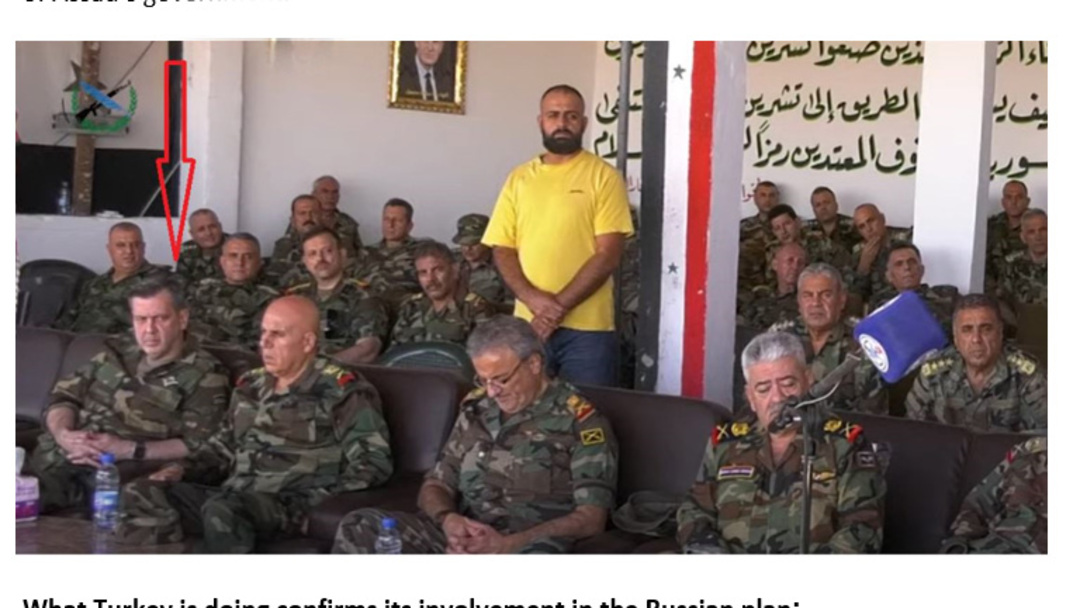
What Turkey is doing confirms its involvement in the Russian plan:
Immediately after the Tehran summit, Erdogan’s speech and that of his foreign minister before him changed. The foreign minister spoke about security and political meetings between the two countries and his meeting with Faisal Miqdad, the regime’s foreign minister. Erdogan spoke about discussions between the two countries, security coordination, the possibility of his meeting with Assad, and the need for reconciliation between the opposition and the regime.
As a result, massive demonstrations took place in the north of Syria and Turkey, in which the Syrians rejected this reconciliation. Some armed factions supported these demonstrations, which annoyed the Turk.
The entire Turkish team supervising the Syrian file for seven years has changed, and Hayat Tahrir al-Sham moved to punish the factions that refused to comply; this move previously mentioned in the paper, which aims to impose complete control of that terrorist-classified body overall fighters' groups, and the street, it had opened special crossings linking them to the regime and exchanging with its coordination and goods.
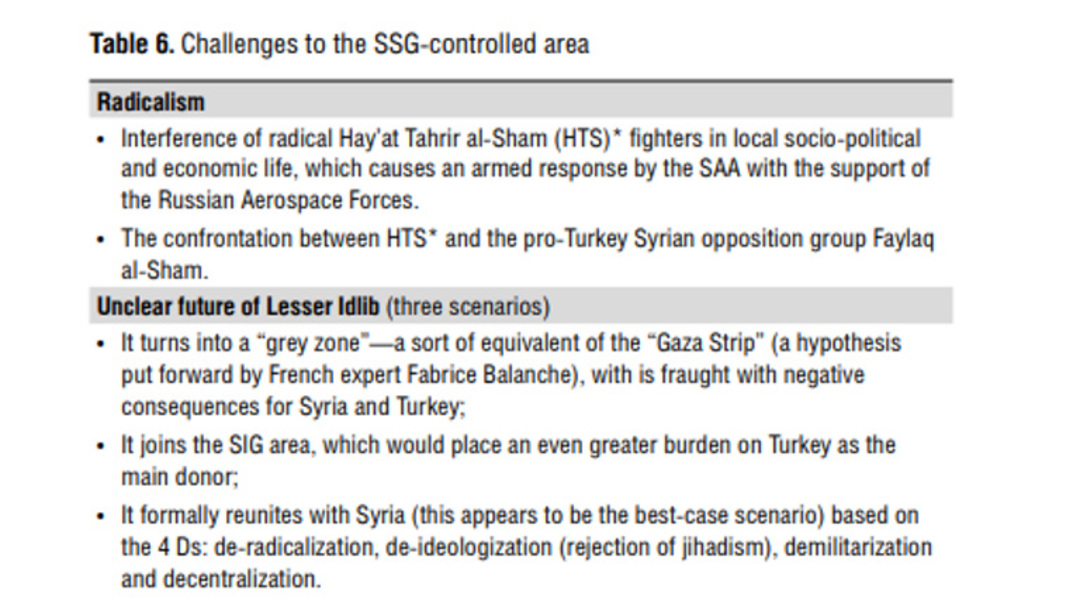
The regime, Russia, and China will benefit from this move by Hayat Tahrir al-Sham (terrorist) to justify closing the only humanitarian crossing that does not pass under the regime’s control on the pretext that the northern region is a new Taliban or a state of terrorism, as the Security Council will fail to renew it early next year with Russian-Chinese support, and this is what The report mentioned earlier.
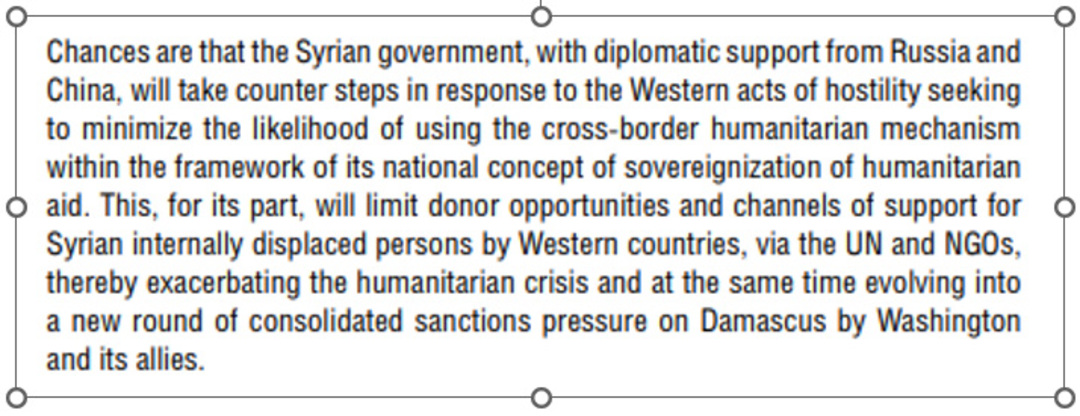
According to those close to Fahim Issa, the leader in the north and who is close to Turkey, he mentioned to them two months ago, after the Tehran summit (that Hayat Tahrir al-Sham will move to dominate the Third Corps in November), and this happened. Still, two weeks earlier, because of the assassinations that took place and accelerated the events related to the invasion. Many Syrians viewed the Turkish delay to respond was a programmed and planned act by Turkey. They fear that Turkey may soon instruct the Syrian opposition and negotiating committees to transfer its headquarters to Damascus and thus accept Assad’s authority and nominal participation in exchange for autonomy in the northwest under the security governance of Haiyat Tahrir al-Sham HTS.
Conclusions:
We are in a race against time, as the new variables suggest an exacerbation of crises and their tendency to erupt. Who is ahead of whom? Who is the fastest and most decisive? Who is the least tolerant? The democratic countries where the authorities fall to the slightest crisis? Or totalitarian states that govern control over their people?
What is the West’s plan to this Russian presentation of Economic unity? Has the West begun to think of a confrontation study towards Russia’s, China’s, and Iran’s new plan for the Levant region? Or is the West still only betting on the single possibility of Putin’s defeat in Ukraine while he is beating on expanding the circle of conflict in the Middle East and on the exacerbation of crises in the already fractured Western economy?
In the end, Syria cannot be considered a delayed and low-ranking card in the list of priorities. Instead, it is at the heart of the current global conflict the strategic mistake made by the West and Israel in ignoring the competition in it and exploiting it as an arena of exhaustion for the opponents by allowing the extremist forces, Iranian militias, and then the Russian army to dominate it, and fight on its land. We will pay dearly for that mistake, for what has drained is peace, security, democracy, civilization, and the future of the peoples in the region; that mistake encouraged totalitarian regimes to dominate the world.
BY: Dr. Kamal Allabwani
You May Also Like
Popular Posts
Caricature
BENEFIT Sponsors BuildHer...
- April 23, 2025
BENEFIT, the Kingdom’s innovator and leading company in Fintech and electronic financial transactions service, has sponsored the BuildHer CityHack 2025 Hackathon, a two-day event spearheaded by the College of Engineering and Technology at the Royal University for Women (RUW).
Aimed at secondary school students, the event brought together a distinguished group of academic professionals and technology experts to mentor and inspire young participants.
More than 100 high school students from across the Kingdom of Bahrain took part in the hackathon, which featured an intensive programme of training workshops and hands-on sessions. These activities were tailored to enhance participants’ critical thinking, collaborative problem-solving, and team-building capabilities, while also encouraging the development of practical and sustainable solutions to contemporary challenges using modern technological tools.
BENEFIT’s Chief Executive Mr. Abdulwahed AlJanahi, commented: “Our support for this educational hackathon reflects our long-term strategic vision to nurture the talents of emerging national youth and empower the next generation of accomplished female leaders in technology. By fostering creativity and innovation, we aim to contribute meaningfully to Bahrain’s comprehensive development goals and align with the aspirations outlined in the Kingdom’s Vision 2030—an ambition in which BENEFIT plays a central role.”
Professor Riyadh Yousif Hamzah, President of the Royal University for Women, commented: “This initiative reflects our commitment to advancing women in STEM fields. We're cultivating a generation of creative, solution-driven female leaders who will drive national development. Our partnership with BENEFIT exemplifies the powerful synergy between academia and private sector in supporting educational innovation.”
Hanan Abdulla Hasan, Senior Manager, PR & Communication at BENEFIT, said: “We are honoured to collaborate with RUW in supporting this remarkable technology-focused event. It highlights our commitment to social responsibility, and our ongoing efforts to enhance the digital and innovation capabilities of young Bahraini women and foster their ability to harness technological tools in the service of a smarter, more sustainable future.”
For his part, Dr. Humam ElAgha, Acting Dean of the College of Engineering and Technology at the University, said: “BuildHer CityHack 2025 embodies our hands-on approach to education. By tackling real-world problems through creative thinking and sustainable solutions, we're preparing women to thrive in the knowledge economy – a cornerstone of the University's vision.”
opinion
Report
ads
Newsletter
Subscribe to our mailing list to get the new updates!





















